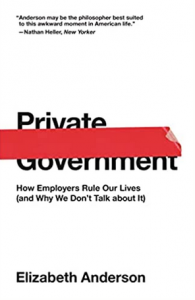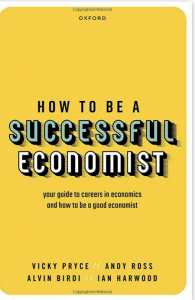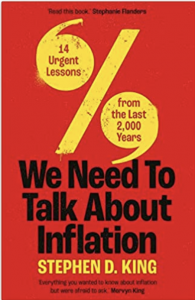I’d previously read about Elizabeth Anderson’s Private Government, but hadn’t actually read it until this weekend. The book consists of her two 2014 Tanner Lectures and the four responses, so is quite old. The lectures draw an analogy between public government – “the people free under the state” – and the private government workers experience when their bosses boss them in unaccountable ways. In other words, the state’s exercise of power in a democracy is justified whereas employer’s exercise of power is not. Along the way, the lectures trace the evolution of the idea of a free market as a means of exercising freedom (in the 17th century with the Levellers and the 18th with Adam Smith) to the 21st century ideology of ‘free markets’ as essentially a means of exercising corporate power.
As respondent Niko Kolodny asks, though, what’s wrong with being governed, even at work? And Tyler Cowen argues that the costs of exiting a job are relatively low – Anderson compares leaving a job as a path to freedom is like saying Italians under Mussolini were free because they could leave the country (until they couldn’t, of course). This is surely hyperbole. There are without question abusive employers of marginalised workers and it behoves those of us with good jobs to appreciate this. But an argument about employer abuses is an argument about the need for the state (public government) to do a better job with legal protections and their enforcement. For instance, governments (and the legal profession) are finally bearing down on the extensive use of NDAs; good. It is harder than it was even 10 years ago to fire an employee over their sexual preferences. People can be fired for expressing some views on social media – when these are illegal or just vile and damaging to their employer’s reputation, also good.
Anderson – whose Value in Ethics and Economics is a terrific book* – doesn’t bring in to the argument two issues that seem relevant. One is the Hirschman triptych of exit, voice and loyalty, which is a useful way of thinking about power in economic relationships and could have shed light on this context. The other is Elinor Ostrom,** whose private governance model by definition takes a form that is not arbitrary and abusive but consensual – it would have been interesting to see her design principles discussed in the context of the worker-employer relationship. The master key to governance design seems to be information asymmetries and the possibility of monitoring – I think this is why in the context of modern digital technologies we see on the one hand increased surveillance of workers in some jobs and firms, and on the other hand increased autonomy in decision-making for workers in different jobs and firms. The latter are high-trust and more productive organisations.
So I have every sympathy with Anderson’s criticism of bad workplace relationships, and the value of worker autonomy. But the lectures aren’t all that persuasive.
*I have an old copy – not sure why it’s so expensive even 2nd hand now.
**Also weirdly priced at £226.84 for the paperback on Amazon today – maybe the algorithm doesn’t like the heat?





